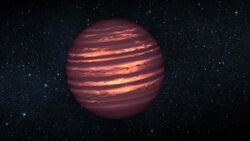Astronomy:2MASS J22282889–4310262
| Observation data Equinox J2000.0]] (ICRS) | |
|---|---|
| Constellation | Grus |
| Right ascension | 22h 28m 28.894s[1] |
| Declination | –43° 10′ 26.27″[1] |
| Characteristics | |
| Spectral type | T6[2] |
| Apparent magnitude (J) | 15.662[1] |
| Apparent magnitude (H) | 15.363[1] |
| Apparent magnitude (K) | 15.296[1] |
| Astrometry | |
| Proper motion (μ) | RA: 51.7[3] mas/yr Dec.: -301.3[3] mas/yr |
| Parallax (π) | 94.0 ± 7.0[4] mas |
| Distance | 35 ± 3 ly (10.6 ± 0.8 pc) |
| Details[5] | |
| Radius | 0.94±0.16[6] RJup |
| Surface gravity (log g) | 5.0 cgs |
| Temperature | 900 K |
| Rotation | 1.41±0.01 h |
| Age | 1[6] Gyr |
| Other designations | |
| Database references | |
| SIMBAD | data |
2MASS J22282889–4310262 is a brown dwarf discovered by the Hubble Space Telescope and The Spitzer Space Telescope in 2013. Using Hubble and Spitzer, NASA astronomers were able to develop the most detailed 'weather map' for brown dwarfs, utilizing different wavelengths of infrared light to show changing light patterns and different layers of material in the windstorms (the layers were generated because water and methane vapors are visible at different infrared wavelengths). This observation was the first time that researchers were able to probe such variability at different altitudes in a brown dwarf.[7] In the outer layers of its atmosphere, gases condense into raindrop-like particles made up of sand and iron which fall into the interior.[8]
Researchers also determined that the object's temperature ranges from 1,100 to 1,300 degrees Fahrenheit (600 to 700 degrees Celsius). The brown dwarf is rotating extremely rapidly, with 1.41 hours rotation period being the smallest reliably measured rotation period of the brown dwarf as of 2021.[2]
References
- ↑ 1.0 1.1 1.2 1.3 1.4 Cutri, Roc M.; Skrutskie, Michael F.; Van Dyk, Schuyler D.; Beichman, Charles A.; Carpenter, John M.; Chester, Thomas; Cambresy, Laurent; Evans, Tracey E. et al. (2003). "VizieR Online Data Catalog: 2MASS All-Sky Catalog of Point Sources (Cutri+ 2003)". CDS/ADC Collection of Electronic Catalogues 2246: II/246. Bibcode: 2003yCat.2246....0C. http://vizier.u-strasbg.fr/viz-bin/VizieR?-source=II/246.
- ↑ 2.0 2.1 Tannock, Megan E.; Metchev, Stanimir; Heinze, Aren; Miles-Páez, Paulo A.; Gagné, Jonathan; Burgasser, Adam; Marley, Mark S.; Apai, Dániel et al. (2021), "Weather on Other Worlds. V. The Three Most Rapidly Rotating Ultra-cool Dwarfs", The Astronomical Journal 161 (5): 224, doi:10.3847/1538-3881/abeb67, Bibcode: 2021AJ....161..224T
- ↑ 3.0 3.1 "2MASS J22282889-4310262". SIMBAD. Centre de données astronomiques de Strasbourg. http://simbad.u-strasbg.fr/simbad/sim-basic?Ident=2MASS+J22282889-4310262.
- ↑ Faherty, Jacqueline K. (2012). "The Brown Dwarf Kinematics Project (BDKP). III. Parallaxes for 70 Ultracool Dwarfs". The Astrophysical Journal 752 (1): 56. doi:10.1088/0004-637X/752/1/56. Bibcode: 2012ApJ...752...56F.
- ↑ Esther Buenzli (24 October 2012). "Vertical Atmospheric Structure in a Variable Brown Dwarf: Pressure-dependent Phase Shifts in Simultaneous Hubble Space Telescope-Spitzer Light Curves". The Astrophysical Journal 760 (2): L31. doi:10.1088/2041-8205/760/2/L31. Bibcode: 2012ApJ...760L..31B.
- ↑ 6.0 6.1 Vos, Johanna M.; Biller, Beth A.; Allers, Katelyn N.; Faherty, Jacqueline K.; Liu, Michael C.; Metchev, Stanimir; Eriksson, Simon; Manjavacas, Elena et al. (2020), "Spitzer Variability Properties of Low-gravity L Dwarfs", The Astronomical Journal 160 (1): 38, doi:10.3847/1538-3881/ab9642, Bibcode: 2020AJ....160...38V
- ↑ "NASA Telescopes See Weather Patterns in Brown Dwarf". http://www.jpl.nasa.gov/news/news.php?release=2013-013.
- ↑ "2MASSJ22282889-431026: The Hybrid Planet-Star With A Stormy Atmosphere". 27 August 2014. http://www.science20.com/news_articles/2massj22282889431026_hybrid_planetstar_stormy_atmosphere-100573.
 |


